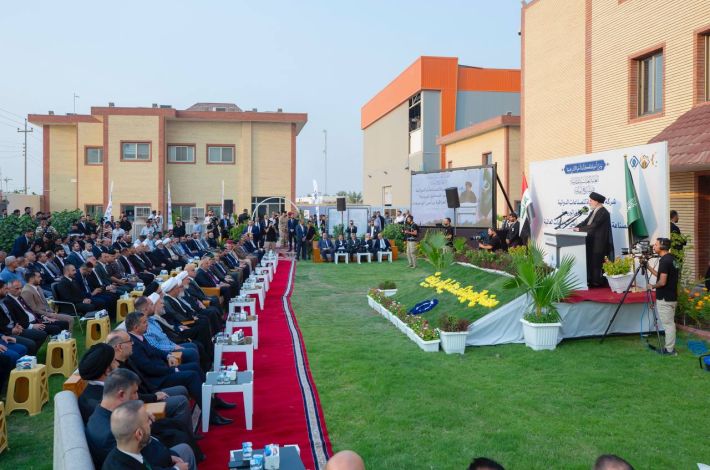The Al-Abbas's (p) holy shrine opened, on Wednesday evening, the Al-Joud factory for intravenous solutions in Karbala province.
The opening ceremony was attended by the Senior Official of the holy shrine; Sayed Ahmad al-Safi, a number of its officials, religious and official figures and specialists from inside and outside the governorate.
The factory is managed by the Engineering Projects Department at the holy shrine, its implementation and financing are under the supervision of a specialized international company, and is a qualitative addition to the Iraqi health sector, as it is planned to produce 27 million bottles annually to meet the need of health institutions in the country.
The opening ceremony began with a beautiful recitation of the verses of the Holy Quran by the reader Sayed Haydar Gelokhan, followed by the speech of the Senior Official of the Al-Abbas's (p) Shrine; Sayed Ahmad al-Safi, during which he announced the donation of Al-Joud intravenous solutions factory with 250 thousand bottles of sodium chloride glucose solutions to the Lebanese people, and another 250 thousand to the Palestinian people, to support the health systems in both countries and alleviate the suffering of those affected.
The Iraqi minister of Health, Dr. Saleh Al-Hasnawi, stressed in his speech that this factory is a qualitative addition to the project of localization of the pharmaceutical industry and represents a big step towards health stability in Iraq.
He added that the Al-Joud intravenous solutions factory project, with its production capacity of up to 27 million treatment units, represents a big shift that we urgently need, as drug Security can only be achieved by localizing the pharmaceutical industry.
For his part, the head of the Engineering Projects Department, engineer Dia al-Sa'egh, said in his speech that the projects of the Al-Abbas's (p) Shrine aim to serve the community and provide food, industrial, educational and health security for the country, under the umbrella of Iraqi laws and under the title (made in Iraq).
He added that the first step in establishing the project was the preparation of internationally approved designs approved by the Iraqi Ministry of Health, and one of the international design companies and an international consulting company were selected to implement the project in order to make it successful within international specifications.
As for the infrastructure, the factory manager, Mr. Haydar al-Gar'awi, said that the factory includes more than 17 buildings, most of which were built with multiple floors, in addition to the security information and control buildings, the housing, production and industrial services building (Dark utilities) and the garage, in addition to two buildings (Clean Utilities), specialized laboratories, and an Information Systems Center, with an area of 8,500 square meters.
The ceremony also included a speech by the Austrian company (BWT) supervising the factory, a presentation of a patent for a bed and a wheelchair for people with special needs, in addition to a field tour for the delegations inside the corridors of the factory.
The Al-Joud factory is characterized by adopting devices and equipment of the best international origins, and produces more than 24 types of intravenous solutions, which contributes to enhancing drug security and supporting the health sector in Iraq.





























